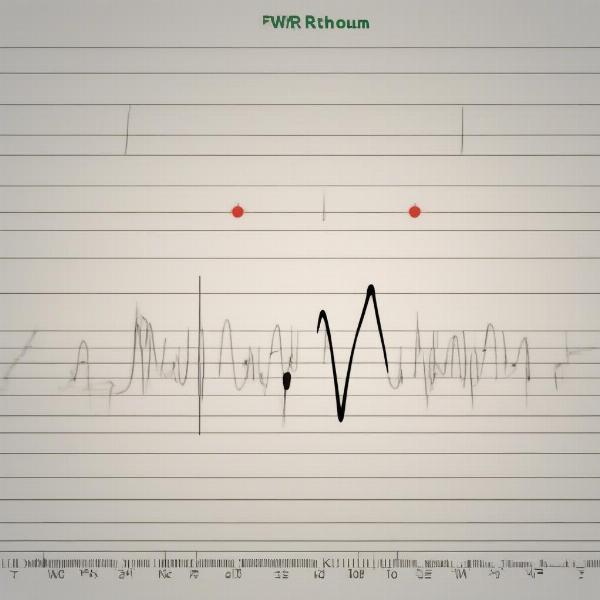Understanding the electrical activity of your dog’s heart can be crucial for diagnosing and managing various heart conditions. An electrocardiogram (EKG or ECG) is a simple, non-invasive procedure that records these electrical signals, providing valuable insights into your dog’s cardiovascular health. Whether you’re a seasoned dog owner or just starting your journey with a canine companion, learning about EKGs can empower you to make informed decisions about your dog’s well-being.
What is an EKG for Dogs and Why is it Important?
An EKG for dogs, just like in humans, is a test that measures the electrical activity of the heart. It’s a painless and relatively quick procedure that can detect a range of heart problems, from irregular heartbeats (arrhythmias) to heart enlargement. Early detection of these issues can significantly improve treatment outcomes and your dog’s overall quality of life.
Understanding the Procedure: How is a Dog EKG Performed?
The process of performing an EKG on a dog is straightforward. Your veterinarian will typically have your dog lie comfortably on its side. Small, sticky electrodes are then attached to the dog’s paws and chest. These electrodes detect the heart’s electrical signals, which are then transmitted to an EKG machine. The machine records the signals as a waveform, which the veterinarian then analyzes for any abnormalities.
 Interpreting Dog ECG Results
Interpreting Dog ECG Results
When is an EKG Recommended for Your Dog?
There are several situations where your veterinarian might recommend an EKG for your dog. These include:
- Suspected heart disease: Symptoms such as coughing, difficulty breathing, exercise intolerance, or fainting can indicate underlying heart problems.
- Breed predisposition: Certain breeds are more prone to specific heart conditions.
- Pre-anesthesia evaluation: An EKG is often part of a pre-anesthetic workup to assess the heart’s health before surgery.
- Monitoring drug therapy: Some medications can affect the heart, and an EKG can help monitor for any adverse effects.
- Geriatric screening: As dogs age, their risk of developing heart problems increases.
Interpreting the Results: What Does a Dog EKG Tell Us?
A veterinarian analyzes the EKG waveform to assess the heart’s rate, rhythm, and electrical conduction. This information can reveal:
- Arrhythmias: Irregular heartbeats, such as tachycardia (fast heart rate) or bradycardia (slow heart rate).
- Heart enlargement: Changes in the EKG waveform can indicate enlargement of the heart chambers.
- Myocardial infarction (heart attack): Although less common in dogs than humans, EKGs can detect evidence of a heart attack.
- Electrolyte imbalances: Certain electrolyte abnormalities can affect the heart’s electrical activity.
What Happens After an EKG?
Based on the EKG results, your veterinarian may recommend further diagnostic tests, such as an echocardiogram (ultrasound of the heart) or blood tests. They will discuss the appropriate treatment plan with you, which may include medication, dietary changes, or lifestyle modifications.
FAQ
- Is an EKG painful for my dog? No, an EKG is a non-invasive and painless procedure.
- How long does a dog EKG take? The procedure itself usually takes only a few minutes.
- Does my dog need to be sedated for an EKG? Most dogs tolerate the procedure well without sedation.
- How much does a dog EKG cost? The cost can vary depending on the veterinary clinic, but it is typically a relatively affordable diagnostic test. dog ecg
- What should I do if I think my dog is having heart problems? Contact your veterinarian immediately if you notice any symptoms of heart disease in your dog.
- Can an EKG diagnose all heart conditions? While an EKG provides valuable information, it may not be able to diagnose all heart conditions. Further testing may be required.
- Are there any risks associated with a dog EKG? There are very few risks associated with an EKG. It is a safe procedure for most dogs.
Related Articles
If you found this information helpful, you might also be interested in reading our articles on Canine Heart Disease, Dog Breeds Prone to Heart Conditions, and Caring for a Senior Dog.
About ILM Dog
ILM Dog is your trusted resource for expert advice on dog care and well-being. We provide comprehensive information on a wide range of topics, including breed selection, health and medical care, training and behavior, nutrition, grooming, exercise, and more. With a focus on evidence-based practices and a commitment to providing clear and accessible information, we empower dog owners to make informed decisions about their furry companions. Whether you’re a new dog owner or a seasoned expert, ILM Dog is here to support you every step of the way. dog ecg Contact us at [email protected] or +44 20-3965-8624 for any inquiries.